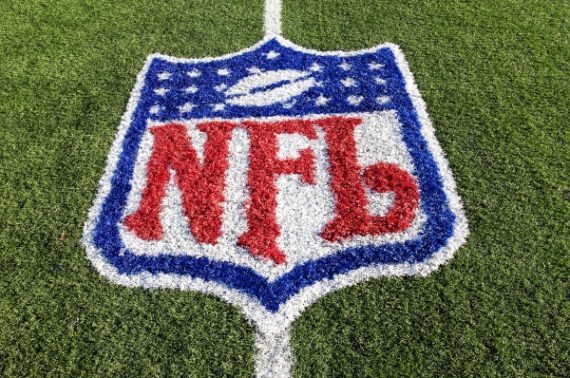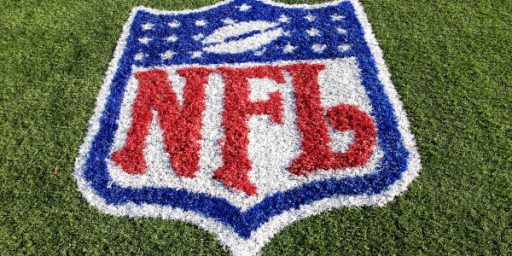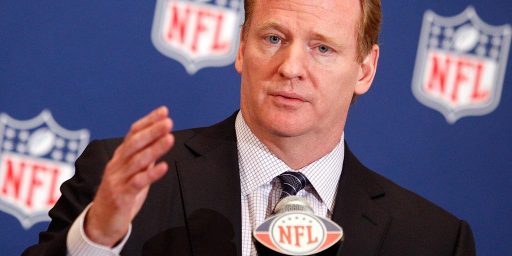N.F.L. To Give Up Its Tax Exempt Status
The N.F.L.'s league office is giving up its tax exempt status, but that means far less than the headline implies.
In a somewhat surprising move, the National Football League’s main office announced yesterday that the league would be ending its tax exempt status under the tax code:
The N.F.L.’s league office will drop its tax-exempt status, which is decades old, in response to critics, including some members of Congress, who claim that the government is losing millions of dollars in potential revenue.
As a result, the league will no longer have to publicly disclose its tax returns, which include the salaries of its top executives, including Commissioner Roger Goodell. Major League Baseball took a similar step several years ago. The league offices of the National Hockey League, the L.P.G.A. and several other sports organizations still have tax-exempt status.
Though the N.F.L.’s 32 teams are for-profit businesses and pay taxes, the league office has operated as a tax-exempt industry association in various forms since the 1940s. Under the tax code, the league office is considered the marketing arm of the teams; it creates rules, negotiates sponsorship and television deals and performs other centralized functions. As a tax-exempt organization, the N.F.L. has had to release its Form 990 returns.
For years, former Senator Tom Coburn, a Republican from Oklahoma, criticized the league’s status, claiming that it deprived the United States Treasury of millions of dollars in taxes. The chorus of critics rose in 2014 when the league office’s filings with the Internal Revenue Service showed that Goodell received $44.2 million in fiscal year 2012. Goodell was paid $35 million in 2013.
“The owners have decided to eliminate the distraction associated with misunderstanding of the league office’s status, so the league office will in the future file returns as a taxable entity,” Robert McNair, the owner of the Houston Texans and the chairman of the league’s finance committee, said in a statement.
In a memo to all 32 teams, Goodell said the league would notify “interested members of Congress” of the change.
Goodell said the finance committee had been studying the change for a year. Goodell said the league office would begin filing tax returns as “taxable entities” in fiscal year 2015, which began this month.
The commissioner said that “the effects olf the tax-exempt status of the league office have been mischaracterized repeatedly in recent years” and that “every dollar of income generated through television rights fees, licensing agreements, sponsorships, ticket sales and other means is earned by the 32 clubs and is taxable there.”
The new tax status for the league office “will make no material difference to our business,” he wrote. “As a result, the committees decided to eliminate this distraction.”
The “distraction” included politicians demanding that the league office drop its tax-exempt status. The N.F.L. is a private business that is largely unregulated. The league office’s tax-exempt status, its use of public airwaves to broadcast games and its antitrust exemption are a few of the ways that Congress has leverage over the league.
Prior to this decision, the league as an organization, as opposed to the individual teams, has been considered tax exempt under Section 501(c)(6) of the Internal Revenue Code, a provision that allows organizations loosely defined as “business leagues” to claim tax exempt status for the overall organization, although the individual members would generally still be covered by the regular provisions of the tax code. Up until 2007, Major League Baseball was covered by this provision of the law before electing to make the change itself, and as of now the sports leagues that have claimed status under this portion of the law include the N.F.L., the National Hockey League, and the Professional Golf Association. Because of the large amount of money that it brings in on an annual basis through broadcasting revenues, merchandising, sponsorship, and other deals, though, it has been the N.F.L. that has been subjected to the most criticism for taking this tax status. As noted, former Senator Tom Coburn talked about repealing the exemption while he was in office, and since he left at the end of the year the cause has been taken up by Utah Congressman Jason Chaffetz.
The idea that the N.F.L. was “tax exempt” has always been something of a populist diversion, though, largely because it leaves the public with the impression that the league has gotten away with not paying millions of dollars in taxes while making billions of dollars a year. The reality, of course, is quite different. The vast majority of the revenue that the league as a whole earns ends up getting passed on to each of the individual teams and those teams all pay taxes at the Federal, State, and Local levels as required by law. Most of the money that the league office holds back is used to pay the expenses necessary for the operation of the collective enterprise, which includes everything from the salaries of the people employed by the N.F.L. to the expenses associated with events like the Super Bowl that aren’t paid for by other means. Given that, it is entirely unclear how much additional tax revenue the government will actually get now that the league will be filing a regular tax return. One study determined that repealing the 501(c)(6) exemption for all professional sports leagues would lead to an additional $109 million in tax revenue over the course of ten years.
Additionally, when you look at the league’s finances, it’s unclear how much they actually would end up owning in taxes:
While the N.F.L. as a whole generates more than $10 billion in revenue annually, the league office ran a $13.5 million deficit in fiscal year 2013, which ended in March 2014. In fiscal year 2012, the league office showed a profit of $9 million, but it ran a deficit of $77.6 million the year before that.
The league office has issued bonds that are used to make loans to owners who build or refurbish stadiums. The bonds were issued under the league office’s tax-exempt status, and the league may have to pay taxes on those bonds after the league drops its status.
Indeed, one study a few years ago determined that the league as a whole, including all of the member teams together, actually paid more in taxes because of the exemption:
The NFL had expenses in excess of revenue of $77,628,857 for the year ended 3/31/2012 and $52,195,407 for the prior year. Apparently, that is nothing new. The liabilities of the NFL exceeded its assets by $316,642,454 at 3/31/2012. Superficially, my reasoning would be that if the NFL was organized as an LLC, instead of as an exempt organization, the member teams would have had nearly a third of a billion more in deductions since inception. I’m sure it is more complicated than that, but I suspect that the motivation for the way it operaties may be to keep liabilities off the balance sheets of the member organizations. It appears to me that if there is a game there, it is a GAAP (generally accepted accounting principles) game, not a tax game.
Superficially, it appears that, if the NFL were not an exempt organization, it would not owe federal income taxes, because it has not been making money. If you view the NFL in conjunctions with its member teams, it appears that it has the effect of increasing aggregate taxable income.
Given that, giving up the exemption may actually save the league money, though. Even if it doesn’t, though, the biggest advantage that the league will gain from this decision are the fact that it will no longer have to publicly disclose the league office’s tax return, that it will deprive Congress of one of its main excuses for exercising political pressure over the league as a whole, and that it will deprive the self-appointed populists on Capitol Hill of a favorite cudgel. Given all of that, it would likely still be worth it even if the tax bill does go up a little bit.







I seem to recall that shortly after MLB gave up their tax-exempt status, they described it as having been “tax-neutral”.
Excellent piece Doug.
As soon as I heard this news on drive-time I guessed that the primary reason for doing this was to get away from the 501(c)(6) requirements for public disclosure, in particular, the executive salaries at the NFL home office. There is no doubt that many who look at the 990 were not happy to see the Roger Goodell is currently salaried out at $44M a year.
What it means is that the top executives in the NFL want to receive higher salaries than they’d be allowed in a not for profit.
Interesting. I don’t care one way or the other, but it’s cute how it was a little tempest in a teapot. It looks like the NFL is making a smart move, though.
So how does a not-for-profit company organize itself so that it does pay taxes. How are the owners of the corporation that is the NFL?
Shouldn’t we be looking at the whole tax-exempt accounting thing to see if it is being used in the public interest or is a scam? It is hard for me to be worried about he NFL running a deficit in 2013 when their CEO was taking a salary about three times the deficit. I see similar accounting practices in other organizations such as “charities” and health care. Maybe the whole system could stand an overhaul.
@Slugger:
I think it’s completely inappropriate for the NFL to be a not for profit. That dates from the 1930s when pro football was a hobby that made a little money every once in a while.
That’s changed quite a bit over the intervening 80 years and pro football is now a multi-billion dollar industry. That its member organizations, the franchises, are all for profit makes the situation even more peculiar.
However, the NFL isn’t the only not for profit that follows that model. There are dozens of others including the industry associations for utilities and others in which the association is not for profit while the member organizations are for profit. IMO there needs to be more oversight to ensure that these putatively not for profit associations are actually operating for the public benefit. That’s not so much a matter of the law as one of enforcement.
The biggest breaks that the NFL teams receive from government are exemptions from anti-trust laws at the federal level, and freebies (like stadiums or tax benefits) at the state and local level.